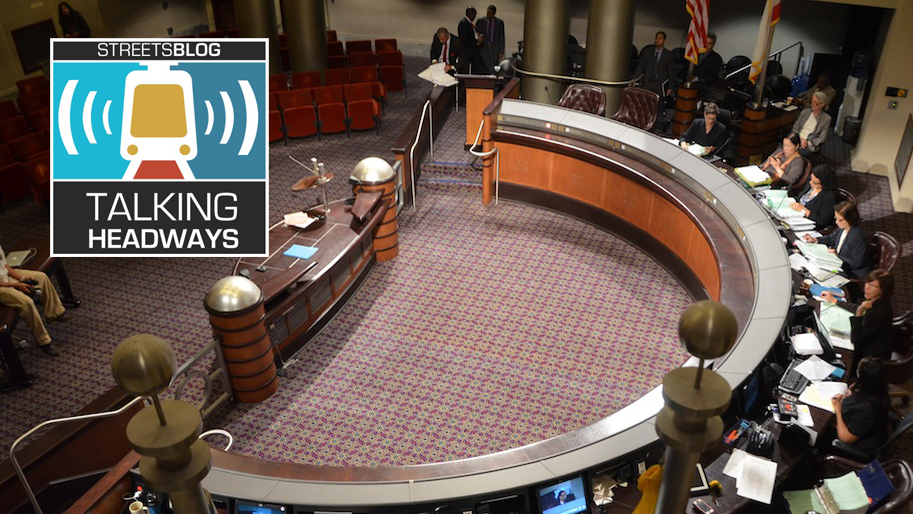This week on Talking Headways we chat with transportation and planning expert Warren Logan, who is running for Oakland City Council in District 3. We discuss the differences in how people perceive government works, the need for more flexible streets, and gives thoughts on housing policy.
Scroll down below the audio player for an edited excerpt of our conversation, or click here for an unedited, AI-generated transcript of the entire conversation.
Jeff Wood: You noted in the past that Oakland and the council seemed to care a lot about transportation projects that will improve safety. But as you just mentioned, it’s like, the timelines are shot, they take too long. So I guess the question is — what’s holding back that implementation speed? What’s keeping the city from moving faster in your mind?
Warren Logan: Oakland is in a really interesting spot. I think a lot of your listeners are more familiar with council members or boards of supervisors or politicians pushing back on transportation improvements, saying, you know, "Let me water this project down because someone yelled at me," or "I’m going to lose a parking spot" or you name it.
What’s interesting in Oakland is that, I think for the first time, maybe, this council actually said, you know, traffic safety is a priority. So that was kind of held in great esteem in the last budget cycle, starting in 2022. And many of the transportation advocacy groups said — rejoice, we’ve won. And I had a really challenging, let’s call it campaign, before actually announcing, telling people that that’s not enough.
It’s not enough to say you support transportation and traffic safety and equitable mobility in name only, because then the real work begins. And what that looks like is not just championing, you know, stronger, more effective, protected bikeways or wider sidewalks or, you know, friendlier bus stops, etc. It’s getting down into the nitty gritty of what’s keeping a city like Oakland — that, despite its budget woes, is very well-funded when it comes to transportation improvements, especially paving, right — from moving forward on the things that we all say we care about and have the money for because usually, dear listener, it’s either there’s political pushback or there’s no money.
In this case, there isn’t, at least on its face, political pushback, and we actually have the money to do the work. So what’s keeping us? And it turns out it’s us. It’s process. So I’m going to just quickly describe how many times you have to go to the city council to ask for permission to basically create a major capital improvement. Many of your listeners are probably familiar with grants like active transportation program grants, which fund, you know, major projects to make things safer for people walking, bicycling, scooting, etc.
We’re talking tens of millions of dollars. Just to accept the money into a city account, you have to go to council to have them say, "Yes, please, we are allowing you to give us that money." Most people don’t know that, that there’s an action you have to take just to accept millions of dollars from another agency.
That alone might take months because you have to schedule it, then you have to put it in a committee, then it has to have two votes at the city council, right? That’s multiple months just to process to accept the money. We haven’t even started the project yet. Then staff come back and say, "Mother may I please spend some of this money to go get a consultant to design the project and do communications with the community."
Again, it has to be scheduled, it has to go to committee, and then it goes to the council. Again, multiple months before you’ve even started designing the project. And God forbid there’s any type of change in there, right? So we are not even building anything yet. We haven’t even started. And we’re now six to eight months into just accepting the money and then saying we’re going to spend it.
By the time you end up with a final design — which everyone knows there’s a lot of hand wringing and political process there and community process — you then have to execute another contracting agreement to spend the money on laborers to build the project. And that’s where a lot of pushback comes in. Not because maybe your council says, "Oh, I don’t want to build this project," but because now we’re having a labor conversation.
Which contractor do I want to get $10 million in construction project money? And now we’re not talking about transportation, we’re talking about political support, we’re talking about spending millions of dollars on maybe a union that you really care about, right? Or this other group that you care more about.
Again, we haven’t built anything. And we’re now multiple years into the process. So the solution that I’ve been really pushing for is to cut that process out, to have the council say by accepting this money, we are assuming we’re going to spend the money. So go ahead and do that. Please keep us abreast of the design and the engagement, but at least work in parallel with the city council, don’t stop the work to come back to me to ask for permission to continue forward because otherwise there’s no sense in accepting the money in the first place if you are going to delay the project by upwards of four to five years just for people to check in and say, "Is it cool if I keep going?"






